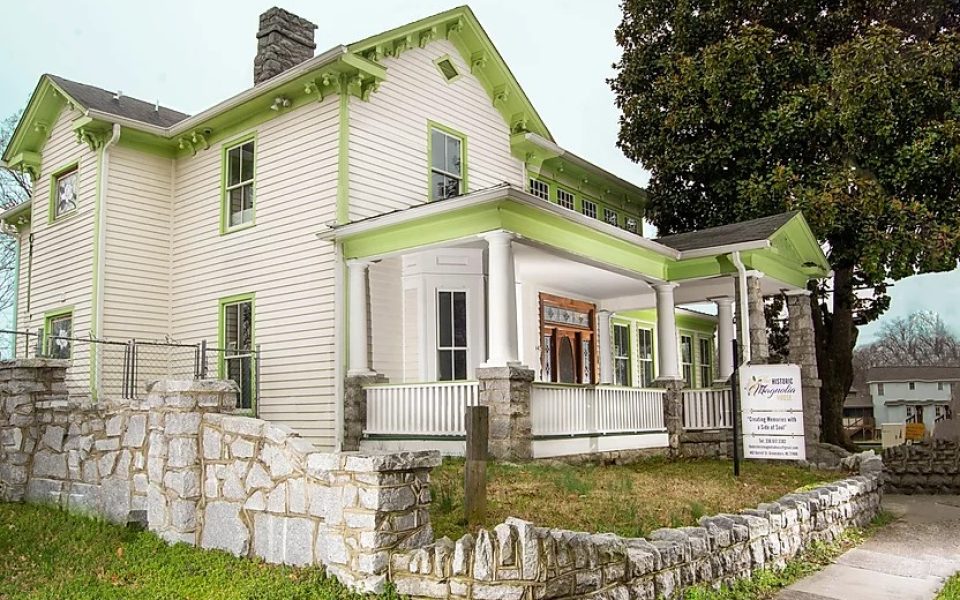The Negro Motorist
Green Book, or simply called “The Green Book” was a guidebook
published between 1936 and 1966 for African-American travelers. Written and
published by a New York mail carrier, Victor Hugo Green, the book listed safe
places for dining, lodging and entertainment during the Jim Crow era and served
as a kind of modern-day Underground Railroad network for black motorists across
the nation. The places listed were the original AirBnB lodgings. Not only were
hotels, motels and restaurants listed in the guide, many establishments were
homes in modest neighborhoods.
Listed in the Green Book from 1955 to 1961, the Historic Magnolia House was one of the only motels in Greensboro available to black travelers.

Nestled in
the Southside neighborhood, The Historic Magnolia House is a gleaming example
of turning something old into something new again. Today, operating as a
nonprofit, the Magnolia House Foundation seeks to preserve the house which was
built in 1889. Past owners Arthur and Louise Gist — parents of Herman Gist, the
late state legislator from Greensboro who died in 1994 — bought the home in
1949 and were the first owners to open it up to the community. In addition to
offering the house up as a motel as a safe haven for black travelers, the couple
also welcomed local groups and activists for weekly meetings.
Presently, guests at
The Magnolia House are treated to elegant place settings with cloth napkins,
crystal glassware, smooth sounds from a live saxophone player and a small, yet
approachable menu. The house is open to the public on Sundays for a jazz
brunch. After church services and before evening supper, guests can dine in a
number of rooms on the first floor, both indoors and al fresco. This past
Sunday it was a lone saxophonist; other Sundays, it’s a three-piece band
complete with a bass and blues guitar.
“We aren’t in the business of competing with other restaurants; we are in the businesses of recreating history,” says the Magnolia House’s current owner Natalie Pass-Miller. “This is the one day or the four times a month that the Triad and North Carolinians can be a part of replicating history.”
Shiny
hardwood floors, well-appointed tables and photos of famous guests decorate the
first floor of the home. The faint scent of magnolia blossoms wafts through the
foyer. The menu is simple, yet soulful.
“We serve hearty comfort food,” says Pass-Miller. “It harks back to childhood foods, it will fill you up and make you happy. “

One entrée
is the fried fish and grits. Whiting filets are presented in a bowl with
creamy, white grits. A chicken breast stuffed with spinach and piquant feta
cheese, covered in a thin cream sauce serves as another entree. Pimiento
macaroni and cheese with a hint of garlic and the sharp tang of cheddar, is one
of the more decadent sides. Dessert changes seasonally but may be a choice of
red velvet cake, 7-Up pound cake or lemon cake.
Guests come
dressed in their Sunday best. The good church shoes that only see the light of
day once a week scuffle across the floor. It feels elegant to sit and dine in
this space. It feels like being a part of history.
Pass-Miller
says she is working to turn the building, which is listed in the National
Register of Historic Places, into a museum. She hopes to tell the history of
the house and eventually reopen rooms to accommodate overnight guests. The goal
is to restore and maintain the house as a historic motel. Sharing bits and
pieces of historical stories and experiences of the African-American community
will add to the tourism experience just like in days of yore.
“Every part of The Historic Magnolia House’s operations is intentional, to continue the legacy of the Gist family when they owned it during its Green Book heydays,” Pass-Miller says. “As we continue to learn more and more about the stories within the walls of the Magnolia House, what we have grown to realize is that Mama Gist worked hard to create a truly safe environment not only due to Jim Crow.
“All proceeds outside of what is needed to
run the Sunday operation goes back into the repairs and completing the
restoration work,” continues Pass-Miller.
Want to go? The Historic Magnolia House is located at 442 Gorrell Street, GSO. Learn more at the Magnolia Houses Website.
Join the First Amendment Society, a membership that goes directly to funding TCB‘s newsroom.
We believe that reporting can save the world.
The TCB First Amendment Society recognizes the vital role of a free, unfettered press with a bundling of local experiences designed to build community, and unique engagements with our newsroom that will help you understand, and shape, local journalism’s critical role in uplifting the people in our cities.
All revenue goes directly into the newsroom as reporters’ salaries and freelance commissions.


Leave a Reply